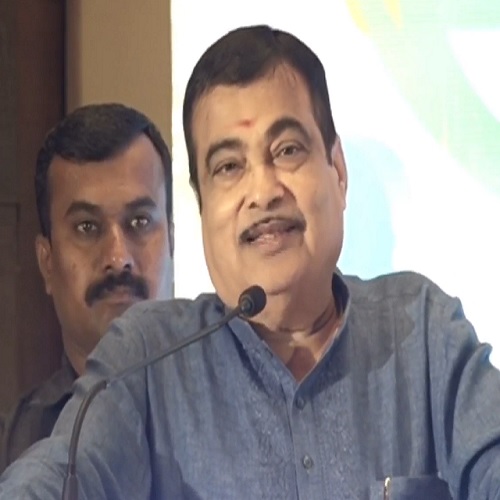‘Ethanol in India surplus, can export’

Union Minister Nitin Gadkari said India, after nearing its 20% ethanol blending target, should now aim to export surplus ethanol. Speaking at IBET 2025, he highlighted India’s rapid biofuel growth, farmer benefits, second-generation fuels, flex-fuel vehicles, and green hydrogen. Gadkari stressed biofuels’ role in cutting imports, pollution, and rural poverty.
Union Minister of Road Transport and Highways, Nitin Gadkari, on Wednesday said that after meeting the target of 20 per cent ethanol blending in petrol, India should now gear up to export ethanol, given its surplus production. “It is the time for India’s futuristic development. We need to reduce our imports and increase our exports. As far as the surplus of ethanol, it is now the requirement of the country that we need to export ethanol,” Gadkari said after inaugurating the second International Conference and Exhibition on Bioenergy and Technologies (IBET) in the national Capital.
Gadkari highlighted India’s rapid progress in biofuels and its potential to become a global energy exporter. “India’s ethanol production capacity reached approximately 1,822 crore litres annually by 30 June 2025, under the government’s Ethanol Blended with Petrol (EBP) Programme. For the Ethanol Supply Year (ESY) 2025-26, the country has already achieved an average 19.05 per cent ethanol blending by 31 July 2025. Production is driven by both molasses (sugarcane-based) and grain (maize, rice) feedstocks,” the Minister informed in the three day inaugural session of the IBET being held at Yashobhoomi where a congregation of stakeholders in the sector and about 150 speakers, panelists have gathered for the way ahead in bio energy sector.
Citing Brazil’s pioneering role in ethanol, Gadkari noted that India too is scaling up rapidly, with corn-based ethanol boosting farmer incomes. “Farmers now earn Rs 45,000 crore more annually because of ethanol policies. Diversifying agriculture towards energy is the need of the hour,” he said.
He further added: “Diversification of agriculture towards energy and power sector is the need of the country, because in our country, in our GDP growth population, belongs to agriculture.”
The MoRTH also underlined India’s advances in second-generation fuels, including initiatives to convert rice straw into ethanol and bio-CNG, tackling both energy needs and stubble burning. “With 500 plants under development, rice straw will no longer be waste but a source of energy,” he said.
On innovation perspective Gadkari spoke of successful trials of bio-bitumen roads, ethanol-powered generators, and flex-fuel vehicles. Major automakers such as Toyota, Tata, Mahindra, Suzuki, and Hyundai are adopting flex-fuel technology, with tractor and construction equipment manufacturers also shifting to biofuels and hydrogen.
He also highlighted the government’s push towards green hydrogen and sustainable aviation fuel, citing pilot projects already underway.
Turning to the economic impact, Gadkari emphasised that while 65 per cent of India’s population is engaged in agriculture, the sector contributes only 14 per cent to GDP. He pointed out that global price dependencies affect Indian farmers: sugar prices are determined by Brazil, oil by Malaysia, corn by the US, and soybeans by Argentina.
“We are facing problems of poverty and unemployment in rural and tribal India because farmers are not getting good prices in the global economy,” he said. He added that permitting ethanol production from corn raised its price from Rs 1,200 to Rs 2,800 per quintal, significantly boosting farmer earnings.
The minister also linked biofuels to tackling pollution and reducing import dependency. “Nearly 40 per cent of air pollution in India is caused by transport fuels. At the same time, we import fossil fuels worth Rs 22 lakh crore annually. It is time for the world and India to embrace alternatives like ethanol, bio-CNG, and sustainable aviation fuel,” he remarked.
The inaugural session was followed by panel discussions on topics such as International Perspective on Bioenergy: Enabling Global Energy Transition with Dr Rahool S Pai Panandiker, Managing Director & Senior Partner, Boston Consulting Group, and included insights from global and national leaders such as Dr Jennifer Holmgren, CEO of LanzaTech; Claus Sauter, Founder & CEO of Verbio Group; Atul Mulay, Chairman of the Bioenergy Committee of IFGE and President of Bioenergy at Praj Industries; Ravi Gupta, Chairman of the IFGE Sugar Bioenergy Forum and Executive Director of Shree Renuka Sugars; and Dr Pradeep Monga, Senior Advisor and Policy Director at the World Biogas Association.
Eminent people who addressed at IBET by included Kimmo Lahdevirta, Ambassador of Finland to India, Kenneth Felix Haczynski da Nóbrega, Ambassador of Brazil to India, while Tarun Kapoor, Advisor to the Prime Minister of India.
“For biofuels to remain viable, taxation systems must evolve. Even when ethanol is dispensed with petrol or biogas flows through common pipelines, it should still be recognised as clean energy. The government is working on solutions to ensure fair pricing and viability for investors.” said Kapoor.
Another key session was, “CBG Panel 1- What is the CBG Investment Status Quo : Achievement and Gaps (CBG/NS/01)”. The session was chaired by Deepak Gupta, IAS (Retd), Former Secretary, MNRE and Director General, National Solar Energy Federation of India, and moderated by Y B Ramakrishna, Senior Vice President, IFGE, and Former Chairman of the Working Group on Biofuel, MoPNG. Panelists included S N Yadav, Executive Director (CBG), GAIL (India) Ltd.; Ashish Kumar, Vice President, IFGE and Managing Director, Verbio India Pvt Ltd; Mahesh Girdhar, MD & CEO, EverEnviro Resource Management Pvt. Ltd.; Kushagra Nandan, CMD, REnergy Dynamics; and Shishir Kalkonde, Chief Executive Officer, VS Lignite Power Pvt Ltd.
The event was followed by more such sessions chaired by experienced people like Dr Virinder Sharma, Member Technical, Commission for Air Quality Management (CAQM).
In the futuristic development of the world and country, we need to develop futuristic technology with innovation, cutting edge research and cost-effectiveness. India has huge potential in Biomass and is in a position to make sustainable Bio-Aviation fuel a reality. — Nitin Gadkari, Minister of Road Transport & Highways, Govt. of India at India Bio Energy & Tech Expo
To Read more about Ethanol Industry & Bio Energy News, continue reading Agriinsite.com
Source : The Pioneer














